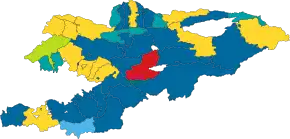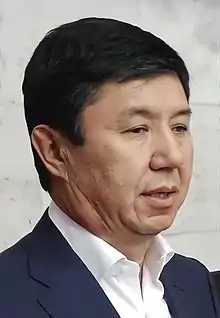2015 Kyrgyz parliamentary election
Parliamentary elections were held in Kyrgyzstan on 4 October 2015.
| |||||||||||||||||||||||||||||||||||||||||||||
All 120 seats in the Supreme Council 61 seats needed for a majority | |||||||||||||||||||||||||||||||||||||||||||||
| Turnout | 58.89% ( | ||||||||||||||||||||||||||||||||||||||||||||
|---|---|---|---|---|---|---|---|---|---|---|---|---|---|---|---|---|---|---|---|---|---|---|---|---|---|---|---|---|---|---|---|---|---|---|---|---|---|---|---|---|---|---|---|---|---|
| |||||||||||||||||||||||||||||||||||||||||||||

Electoral system
The 120 seats in the Supreme Council were elected by proportional representation in a single nationwide constituency, with an electoral threshold of 7% on the national level, as well as 0.7% on each of the nine provinces. No party is allowed to hold more than 65 seats.[1] Party lists were required to have at least 30% of the candidates from each gender, and every fourth candidate had to be of a different gender. Each list was also required to have at least 15% of the candidates being from ethnic minorities.[1]
Biometric voter registration was introduced following claims of vote rigging in previous elections.[2]
Campaign
Several political parties were formed in the run-up to the elections, often as an attempt by wealthy Kyrgyz to further their own interests.[2] Incumbent Prime Minister Temir Sariyev claimed that places on party lists were sold to bidders, with rumours circulating that a high place on a party's list cost between $500,000 and £1,000,000.[2]
Over 10% of prospective candidates were prevented from running due to criminal convictions, whilst one party's leader, a former boxer, was banned after it was claimed they beat up a rival candidate.[2]
Conduct
Although there were some reports of voter fraud,[3] the OSCE mission stated that the elections had been "lively and competitive" and "unique in this region", whilst the PACE mission stated that voters had "made their choice freely among a large number of contestants."[4]
However, the OSCE noted problems with the biometric voter registration, with many people not having registered in time to receive their ID cards.[4] The Council of Europe raised concerns regarding transparency of campaigns and party financing, stating that it should be improved.[4]
Results
 | |||||
|---|---|---|---|---|---|
| Party | Votes | % | Seats | +/– | |
| Social Democratic Party | 435,968 | 27.35 | 38 | +12 | |
| Respublika–Ata Zhurt | 320,115 | 20.08 | 28 | –23 | |
| Kyrgyzstan Party | 206,094 | 12.93 | 18 | New | |
| Onuguu–Progress | 148,279 | 9.30 | 13 | New | |
| Bir Bol | 135,875 | 8.52 | 12 | New | |
| Ata Meken Socialist Party | 123,055 | 7.72 | 11 | –7 | |
| United Kyrgyzstan–Emgek | 97,869 | 6.14 | 0 | 0 | |
| Zamandash | 43,405 | 2.72 | 0 | 0 | |
| Uluu Kyrgyzstan | 23,899 | 1.50 | 0 | New | |
| Ar-Namys | 12,807 | 0.80 | 0 | –25 | |
| Meken Yntymagy | 12,679 | 0.80 | 0 | New | |
| Congress of the Peoples of Kyrgyzstan | 9,619 | 0.60 | 0 | New | |
| Aalam | 6,398 | 0.40 | 0 | New | |
| Azattyk | 5,355 | 0.34 | 0 | New | |
| Against all | 12,428 | 0.78 | – | – | |
| Total | 1,593,845 | 100.00 | 120 | 0 | |
| Valid votes | 1,593,845 | 98.01 | |||
| Invalid/blank votes | 32,410 | 1.99 | |||
| Total votes | 1,626,255 | 100.00 | |||
| Registered voters/turnout | 2,761,297 | 58.89 | |||
| Source: CEC | |||||
References
- Electoral system IPU
- Voters celebrate Kyrgyzstan’s democratic experiment Financial Times, 4 October 2015
- Social Democrats Leading In Closely Watched Kyrgyz Vote Radio Free Europe Radio Liberty, 4 October 2015
- Monitors Praise Kyrgyz Elections Won By Social Democrats Radio Free Europe Radio Liberty, 5 October 2015


